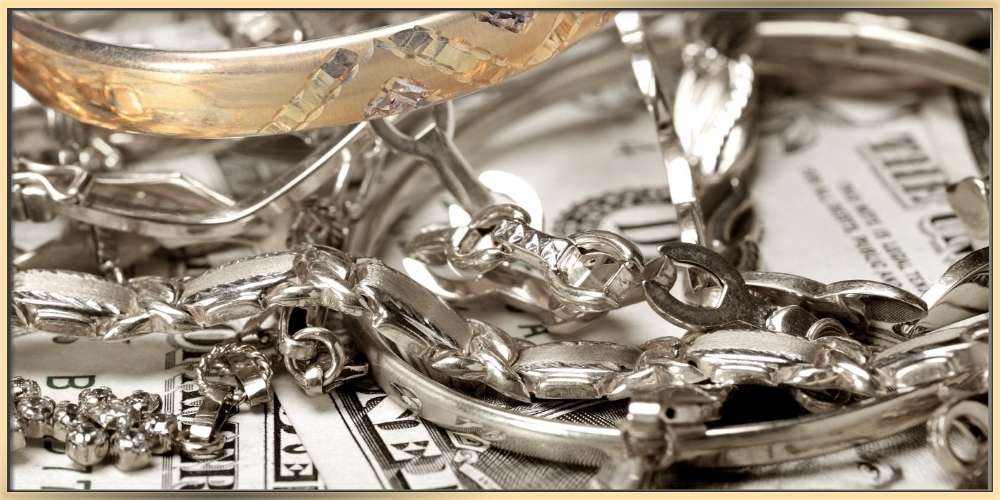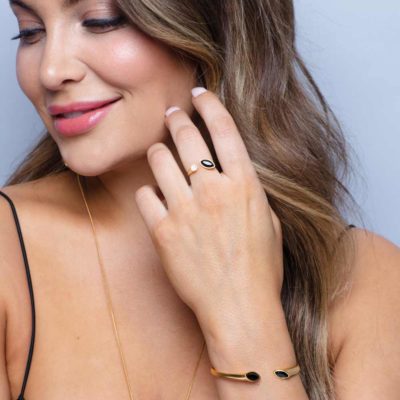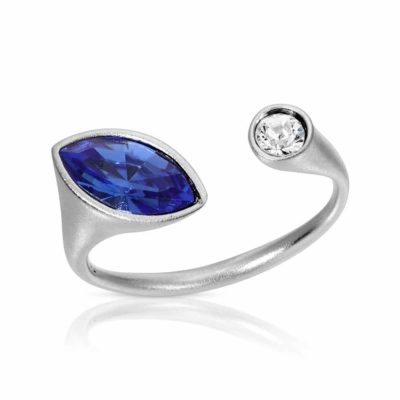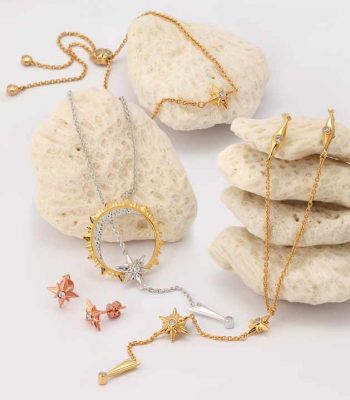Fun Reading, Tips & Recommendations
Jewelry Materials 101: What Are The Best Metals For Jewelry?
You’ve almost certainly heard of gold, silver, platinum, and other popular types of metal. You may even own necklaces, bracelets, earrings, or rings made from these materials. However, have you ever put much thought into the pros and cons of each? Each metal comes with unique attributes, and some are better suited for different people or purposes than others. In this article, we have the key facts about some of the best metals for jewelry, so it’s easy to weigh up your options when you’re looking to make your next jewelry purchase.
What to consider when choosing jewelry
When you’re picking out a gorgeous new necklace, its appearance definitely isn’t the only thing to consider. It’s important to find out what your new piece is made from, so that you can be sure that it ticks all your boxes. You should be asking yourself questions such as:
- Is this a good price point for me?
- Will the piece cause irritation or discoloration on my skin?
- Is the metal durable and strong?
- Is it likely to tarnish or discolor?
- How much upkeep will this piece of jewelry need to look its best? And is that more maintenance than I want to do?
- Will this piece have retained its value if I choose to sell it later on?
- Is it likely to look good against my skin tone and with the rest of my wardrobe?
Of course, the questions you ask yourself will vary from person to person. Your criteria will also depend on the reason you’re buying the piece of jewelry. It’s vital that you take your time and carefully consider the metal, so you know it meets all your criteria.
7 of the best jewelry metals
Many people aren’t familiar with the unique traits of many of the metals that are commonly used in jewelry making. This guide can help you to get an idea of the pros and cons associated with each material, so you can choose a piece of jewelry that’s truly perfect for you.
1. Gold
Gold is one of the most precious metals on the planet. Bright, dense, and highly malleable, it’s no surprise that, for centuries, this metal has been highly valued all over the world.
Pros:
- Comes in a range of beautiful colors, including white gold, rose gold, and the classic yellow hue.
- Looks incredible against a warm skin tone.
- Hypoallergenic, which means it’s unlikely to cause irritation or discoloration to your skin.
- Timeless, elegant appearance.
- Very likely to retain its value, should you choose to sell your gold jewelry.
Cons:
- Gold is very expensive. For many people, the high cost is the main drawback of this popular metal.
- In its pure form, gold is very soft. Usually, gold jewelry is made from an alloy of gold and a cheaper metal, which makes it more durable and affordable. Even so, it often still gets scratches, which can be annoying.
2. Silver
Like gold, silver is one of the most classic precious metals. Its subtle and sophisticated style is perfect for those with cool toned colorings.
Pros:
- Beautiful, highly reflective appearance. Silver is actually the most reflective of all the metals, reflecting 95% of light.
- Looks great on people whose skin has blue undertones.
- More abundant, and therefore more affordable, than many other precious metals.
- Timeless and stunning.
Cons:
- It’s more high maintenance than other metals. When silver reacts with sulphur in the air, it forms black silver sulphide on the metal’s surface. This process is often sped up by things like oil on your skin and moisture. Therefore, it’s important to keep your silver clean and dry.
- Silver is a very soft metal. While it’s usually combined with another metal before being turned into jewelry, even these alloys can be prone to scrapes.
3. Sterling silver
This is a popular alloy made of fine silver and other metals, such as copper, zinc, and nickel. The most common variety of sterling silver is 0.925 sterling silver, which is 92.5% silver and 7.5% copper. Sterling silver is a great choice if you’re looking for the appearance of silver, but want something more durable and affordable.
Pros:
- Much cheaper than silver in a more pure form (e.g. silver plated jewelry).
- Versatile and not too precious – perfect for daily wear.
- Not too hard to look after. Even though sterling silver requires some polishing and maintenance to keep it looking great, it’s cheap and easy to do this at home. Some other metals will need to be taken to a jeweler for upkeep.
Cons:
- Not hypoallergenic, if it contains any metals that may cause a reaction.
- Even though it’s an alloy, it’s still quite soft.
4. Titanium
This lightweight metal is both affordable, high quality, and lightweight, which is why it’s one of the best metals for jewelry such as nose studs and belly bars. It’s also durable, so it’s perfect for items you plan to wear often or never take off, such as wedding bands.
Pros:
- Very lightweight, which is great if you live a very active lifestyle or are looking for body jewelry.
- Strong, durable, and resistant to tarnishing.
- Much more affordable than precious metals.
- It’s hypoallergenic.
Cons:
- Titanium isn’t very malleable, so many handworking jewelers don’t use it. It can be hard to find unique, bespoke titanium jewelry.
- Its hardness also means it usually can’t be engraved with more intricate patterns. Unless you’re looking for simple men’s jewelry (e.g. wedding bands) or minimalist pieces, you might want to choose another metal.
- Titanium rings are often too hard for medical staff to cut off in the case of an emergency, which can be dangerous.
- Jewelry made from this metal can’t be resized – so be careful buying titanium rings!
5. Tungsten carbide
Tungsten is a popular and affordable metal for wedding bands. It’s very brittle when in its pure form, so tungsten jewelry is almost always made of tungsten carbide. This metal is quite similar in terms of price and durability to titanium. However, the main difference is that tungsten is a lot heavier. If you like feeling the weight of your jewelry, you might prefer tungsten over titanium.
Pros:
- Incredibly durable. It won’t bend out of shape, and it’s scratch resistant. Tungsten rings are great for those who work with their hands or have an active lifestyle.
- Much more affordable than many other popular metals.
Cons:
- Just like titanium, tungsten isn’t malleable and is difficult to work with. This means it can’t be resized, and it’s often hard to find tungsten jewelry that features detailed designs.
- If it comes into contact with a lot of force, tungsten jewelry’s natural brittleness can actually cause it to crack.
6. Platinum
Platinum is a very highly regarded metal, known for its beautiful silvery-white color. This metal is very heavy, hard, and tarnish resistant. Being both expensive but also very high quality, it’s no surprise that platinum is a popular choice for bridal jewelry.
Pros:
- More resistant to corrosion and tarnishing than most other precious metals.
- Maintains its color well and doesn’t need to be replated often.
- Hypoallergenic, so you don’t need to worry about irritation.
- Very highly regarded. Many people consider platinum to be one of the best metals for jewelry, so you’ll surely feel very confident and proud whenever you wear it.
Cons:
- Often very expensive.
- One of the heaviest metals, which may not be great, depending on your lifestyle. However, if you like weightier pieces, you might consider this to be more of a pro than a con.
7. Rhodium
Rhodium is in the same family of metals as platinum. This is a very precious jewelry material and, due to its rarity and price, it’s usually only used for plating other metals. It comes in a classic silver color, as well as a striking midnight black.
Pros:
- Rhodium is hypoallergenic, so you don’t need to worry about skin irritation.
- Gorgeous appearance.
- Very strong and prone to tarnishing, so it will last a long time and doesn’t need much upkeep.
- Rare and unique. Wearing this gorgeous metal is a great way to make an outfit feel extra special.
Cons:
- Rhodium jewelry is often very expensive.
- Even though this metal is very strong, the plating used by some jewelry makers is usually very thin – less than the width of a strand of hair. So, eventually it will wear down and need to be replated, which can be pricey. But, keep in mind that you can slow down this process by taking steps to care for your jewelry.
What are the best metals for jewelry?
This depends on you! Everyone has different deal breakers when it comes to jewelry. The pros and cons that matter to you may not be a problem for someone else. For instance, some people will only want hypoallergenic jewelry. But, if you don’t have sensitive skin, then you have a lot more freedom in that area.
When choosing the right metal, it also depends on what you’re buying the jewelry for. Not being able to resize a tungsten ring might be an issue if you’re looking for a wedding band that you can wear for the rest of your life. But if you’re just buying casual earrings, then a lack of malleability probably won’t matter to you.
So, as you choose your next piece of jewelry, think about why you’re buying it and the traits that are important to you in terms of material. It’s always a good idea to ask your jeweler or read the description of the piece to find out exactly what it contains. By doing your research, you can feel confident your new piece of jewelry is absolutely perfect for your needs.




